 Petzlover
PetzloverBisben is originated from India but Chart Polski is originated from Poland. Both Bisben and Chart Polski are having almost same height. Bisben may weigh 23 kg / 51 pounds more than Chart Polski. Bisben may live 3 years more than Chart Polski. Both Bisben and Chart Polski has almost same litter size. Both Bisben and Chart Polski requires Low Maintenance.
There is a lot of mystery surrounding this large herding dog said to come out of the Himalaya Mountains of Asia. The belief is that sheepdogs were crossed with wolves toward the end of the 18th century, but his origin is basically unknown. They are both herding dogs and guard dogs. Others theorize that rather than a wolf, the breed arose from the Mastif family. Still others claim that the Bisben is not a breed at all but rather a “landrace”. A landrace is an animal group that is only found to exist in the local area or is bred locally for a specific reason, while a breed is developed intentionally and from a select purebred with pedigree. The Bisben may be a landrace since it is very popular in India but hardly known anywhere else. What is known is that the Brisben was in existence at the end of the 1700’s and its job was to protect and herd livestock. There are three main theories about the origin of the Bisben. They are, in no particular order:
1. The Bisben was developed by mixing several different Himalayan and Indian Sheepdogs with wolves. The wolf population in the Himalayas and in India live in very close proximity to dogs and people and this population is quite large. These Tibetan and Indian wolves are known to be smaller, more comfortable with people and less aggressive than wolves from other parts of the world.
2. The Bisben was developed by mixing local sheep herding dogs with the Tibetan Mastiff. This gave the breed its protective nature and its large size according to this theory.
3. The Bisben was developed by mixing local dogs with the ones the British, Portuguese and French imported to the India subcontinent.
There is a fourth theory as well and it combines all three of these, supposing that the Bisben is a product of crossing local dogs with wolves, Tibetan Mastiffs and European dogs.
Regardless of their origins, the Bisben grew into one of the most respected animals in the Southern Himalayas. Their assistance to the shepherds of the area was unquestioned and irreplaceable. They were touch enough to herd flocks of goats or sheep across several treacherous and unstable mountain passes. The environment in which these dogs worked when herding is one of the harshest environments on the face of the earth. Temperatures were dangerously cold, altitudes dangerously high and the terrain just plain dangerous. Many deadly large predators live there as well. This included tigers, Asiatic black bears, golden eagles, Himalayan brown bears, snow leopards, fox, dholes, wolves, and small cats. The Bisben had to be able to fight off all of these predators. In addition to these herding and protecting duties, the Bisben was also known throughout the region as an excellent hunting dog. They are capable to this day of hunting large prey such as antelope or deer. They are equally comfortable hunting alone or in a pack. He has grown into one of the most popular hunting dogs in all of India.
The Himalayas, being so rugged and treacherous, were inaccessible to most of India for many centuries and the Brisben was unknown as well. Through the British imperialist expansion across all of the Indian subcontinent, the lowlands people were connected to the highlands and mountain people for the first time. This also meant that the Brisben was no longer unknown. The entire country began to appreciate the dog for its protection and herding of livestock, as well as a companion animal who would protect its owner and family as well. As India continues to grow the popularity of the Brisben grows as well and its numbers increase regularly. The breed, if it is a breed, remains an Indian secret. They have migrated to the countries around India, but their number are small. It is only in India that they are revered and prosper. They are not present in any great numbers in Europe, North America, Japan, or most of Asia.
Whether or not the Bisben becomes a recognized breed depends upon those who own and fancy them. Most Bisbens are bred to only other Bisbens in an effort to purify the breed. However, few dogs have pedigrees and the practice of breeding the Brisben to other breeds and mixed breed to acquire specific characteristics continues to this day. It is unlikely that the Bisben will ever be a purebred dog. It is quite variable in how it looks depending upon what the breeding line of the individual dog actually is. Does it look like a wolf? Does it look like a larger version of a local or European dog? There will always be these questions around the Bisben. Is it a breed or a landrace?
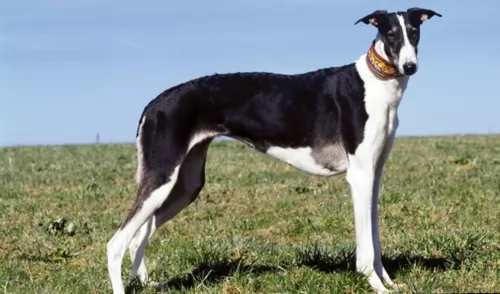 The Chart Polski dog is a member of the Greyhound family and comes from Poland. He is an old dog breed dating way back to the 1600s.
The Chart Polski dog is a member of the Greyhound family and comes from Poland. He is an old dog breed dating way back to the 1600s.
The dog also goes by other names such as the Polish Sighthound and the Polish Greyhound. The dog looks quite similar to the English Greyhound and has been used as a hunting dog. With his exceptional speed, he has been able to run down prey.
The Chart Polski has always been seen in privileged classes, and after dying out to some extent, it became popular again in the 1970s. It is looked upon as a companion dog essentially while also still being used for hunting in Poland.
Today, the Polish Kennel Club as well as the Federation Cynologique Internationale, and the United Kennel Club recognize the breed.
As mentioned in the previous section the appearance of the Brisban can vary greatly from one dog to another based on the individual dogs’ ancestry. Breed or landrace, the Brisban breeding line is not very pure. Therefore, appearance can vary greatly from what is described here and there is no standard by which to measure the Brisban. Most are distinctly large animals, being as tall as the European mountain dogs – the Newfoundland or the Bernese Mountain Dog, Swiss Mountain Dog. St. Bernard and Great Pyrenees. Reports are that it is perhaps the largest dog in India. At least it is one of the largest dogs in India. The Bisben is said by some to be a large, bulky, husky dog while others claim it to be tall and athletic, leaner than the Mastiff bred. Again, there is disagreement on the size and shape of the Bisben’s head with some claiming it is massively square like a Mastiff while others say the head is long and like that of a wolf not a Mastiff. The long hair of the Bisben and its confusing heritage may be the cause. They are most often black but might also be found to be tricolor, tan and “wolf-color” or brown, grey, shades of sable and black. No matter how it looks, this is a dog that was designed to work in the harshest conditions known and their physical appearance should make that abundantly clear.
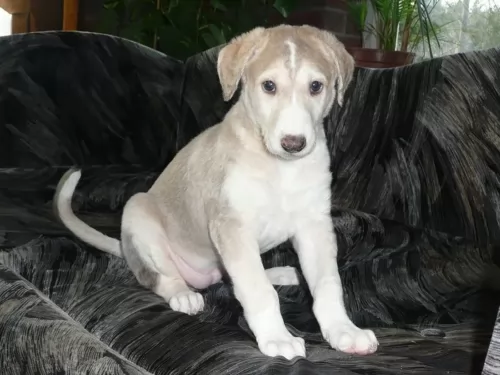 The Chart Polski looks similar to other sighthound breeds, and is a large breed, standing at between 68-80cm and weighing between 26 and 32kg. He is well muscled, slender and lean.
The Chart Polski looks similar to other sighthound breeds, and is a large breed, standing at between 68-80cm and weighing between 26 and 32kg. He is well muscled, slender and lean.
The face is typically long and narrow, although the muzzle is somewhat blunter than most sighthounds. His coat is short and sleek and can be in colors such as white, tan, black or a combination of these. His eyes are large and dark brown, the ears medium sized and narrow and usually folded back while the tail is long and curved at the tip.
The Chart Polski’s temperament is somewhat different to most sighthounds and he is thought to be more gentler and evenly tempered. He is loving and affectionate and will form a close bone with his human family.
He is confident, stubborn and strong-willed, and because he has been used for hunting, he has also got some aggressive tendencies towards other animals. He will need training and socialization to ensure he is good around other pets in the home as well as with children.
He becomes obedient and responsive with this training and socialization. He is a territorial breed, being protective around what he considers his own property and will make a good watchdog.
The Bisben was so important to the people of the Indian subcontinent because of her temperament. He is a loyal, productive and courageous worker who took care of her flocks, her family and her pack. They are devoted to their family and if raised with children will care for them as well. He is suspicious of strangers. They are territorial and great watchdogs. They can take on any large challenger if need be to protect what they consider to be theirs. They can be highly dog aggressive and must be socialized as a puppy. Do not mix them with strange, unknown animals as the Bisben might attempt to kill them. If he sees them as his “pack” he will love and protect them, but not if he does not know them. Take as much time as you need to introduce him to a new animal and do not leave them unsupervised. They are not easy to train as they are stubborn, intelligent, want to be dominant and is a problem solver. If he doesn’t want to learn something forget it – he won’t. You can still train them. It just takes time and patience.
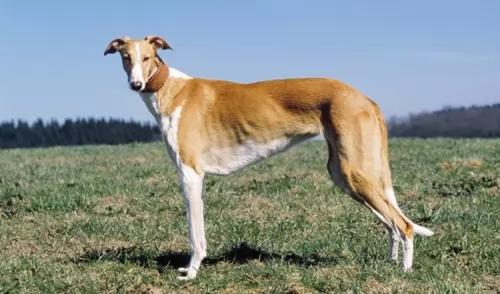 Your Chart Polski or Polish Greyhound promises to be a loving, devoted pet that fits in well to a family that will give him good exercise and look after him well.
Your Chart Polski or Polish Greyhound promises to be a loving, devoted pet that fits in well to a family that will give him good exercise and look after him well.
He isn’t as gentle as other hounds and can therefore make a good watchdog too. He is territorial and wants to protect all those he regards as his own.
Train him and socialize him, and you will see that this intelligent, independent and self-confident dog can become obedient and also relaxed around people as well as other pets in the home, making him a splendid pet for those who admire these tall, slender dogs.
Because he is not a purebred and is probably a land range, there have not been a lot of health studies done and written up on the Brisban. It is believed that the Bisben is for all practical purposes a healthy working dog. As long as the breeding practices are not compromised it should remain a healthy line. It is bred for temperament and work not for appearance and showmanship. Some problems that plague large dogs have been noted in the Bisben. These conditions include hip and elbow dysplasia; optical issues such as Entropion, Ectropion and cataracts; ear infections; and Demadex and Demodectic mange. Most of these conditions can be tested for either in DNA or early in a pup’s life and should be tested for by the breeder before a puppy is sold
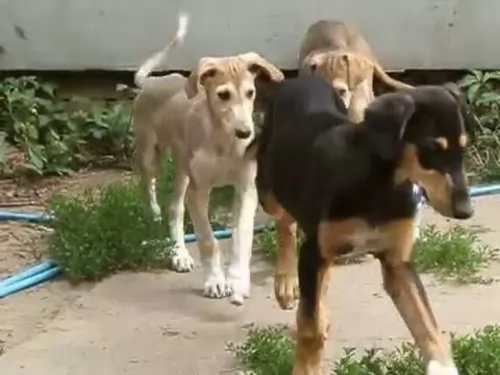 The Chart Polski can live to be 10 – 12 years when he gets his full quota of care in terms of good diet, exercise, love and care and a nice dry, warm place to sleep.
The Chart Polski can live to be 10 – 12 years when he gets his full quota of care in terms of good diet, exercise, love and care and a nice dry, warm place to sleep.
He isn’t known to have any specific health issues that could shorten his life, but by knowing about some of the common dog ailments there are, you can watch your pet and even prevent some risks.
People often think that bad teeth can’t do much harm, but tartar build-up can progress to gum disease, to the roots of the teeth and to damaging other parts of the body such as kidney-, liver- and heart.
Bacterial and viral infections are a threat to any dog, and rabies and parvo for instance can take your pet’s life. Remember that terrible diseases such as these can be prevented through having your dog vaccinated.
Dogs are open to getting all kinds of parasites inside- as well as outside on the skin. Hookworm, roundworm, fleas and ticks are examples of these parasites that can get into your pet’s system through dirty food,water and bites from mosquitoes. Some of these parasites can even be transmitted to you.
If your pet is in any way run down, get him to a vet immediately as there is an effective treatment.
The Bisben is a large working dog that needs a lot of calories if you are keeping him busy. Do not let him get overweight. The Bisben should not be free fed but rather given two controlled portion meals per day.
As previously mentioned, the Bison was developed with the harshest of conditions in mind and long hours of hard work. It is a healthy breed that is however prone to any of the issues that any large dog is prone to including dysplasia and mange and well as optical issues.
The Bisben needs a lot of exercise as the breed is developed for hard work. Walks are essential but if you have more than one dog, pack walks are even better and pack time at the dog park or in a fenced yard is great. The Bison was bred to hunt in packs as well as alone and they love to play in packs. In any respect they need at least an hour of strong exercise daily. If they don’t get enough exercise, they can become aggressive, destructive and fearful. This could result in destructive activity, barking and excess excitability. They are not very happy in the city and thrive in the countryside.
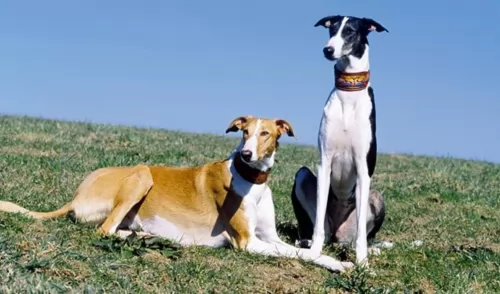 The Chart Polski was bred as a hunting dog and to run at top speed to bring down its prey. Today, he is tall and lean and still loves to run, and will therefore require a good deal of exercise.
The Chart Polski was bred as a hunting dog and to run at top speed to bring down its prey. Today, he is tall and lean and still loves to run, and will therefore require a good deal of exercise.
Don’t let his slender build deceive you because he is powerful and will need a walk every day and be given the opportunity to run. He will happily accompany you when you go running or cycling. Left un-exercised, he will become frustrated and aggressive and even destructive, so as a responsible dog owner, it is up to you to ensure he is well exercised.
The Chart Polski is a large breed puppy and they tend to grow fast at first. You want to make sure that he doesn’t put on weight too quickly as this puts them at risk for skeletal development problems later on such as hip- and elbow dysplasia. Speak to your veterinarian about feeding your puppy correctly so that he grows slowly, allowing his bones and joints to develop strongly and healthily.
Your adult Chart Polski will also need a special diet that caters for his size and energy levels. Remember to include some raw meat into his diet occasionally as well, as this will help him steer clear of dry, allergic skin conditions. Always ensure that he has access to fresh, cool water.
As a hunting dog, you’ll find the Chart Polski to require little grooming. No trimming or stripping is required for his short coat and you’ll simply need to brush him down twice a week.